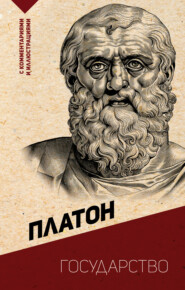По всем вопросам обращайтесь на: info@litportal.ru
(©) 2003-2025.
✖
The Republic
Настройки чтения
Размер шрифта
Высота строк
Поля
That is also good, he said; but I should like to know what you mean?
To another, I replied, I might have a difficulty in explaining; but I am sure that you will admit a proposition which I am about to make.
What is the proposition?
That since beauty is the opposite of ugliness, they are two?
Certainly.
And inasmuch as they are two, each of them is one?
True again.
And of just and unjust, good and evil, and of every other class, the same remark holds: taken singly, each of them is one; but from the various combinations of them with actions and things and with one another, they are seen in all sorts of lights and appear many?
Very true.
And this is the distinction which I draw between the sight-loving, art-loving, practical class and those of whom I am speaking, and who are alone worthy of the name of philosophers.
How do you distinguish them? he said.
The lovers of sounds and sights, I replied, are, as I conceive, fond of fine tones and colours and forms and all the artificial products that are made out of them, but their mind is incapable of seeing or loving absolute beauty.
True, he replied.
Few are they who are able to attain to the sight of this.
Very true.
And he who, having a sense of beautiful things has no sense of absolute beauty, or who, if another lead him to a knowledge of that beauty is unable to follow – of such an one I ask, Is he awake or in a dream only? Reflect: is not the dreamer, sleeping or waking, one who likens dissimilar things, who puts the copy in the place of the real object?
I should certainly say that such an one was dreaming.
But take the case of the other, who recognises the existence of absolute beauty and is able to distinguish the idea from the objects which participate in the idea, neither putting the objects in the place of the idea nor the idea in the place of the objects – is he a dreamer, or is he awake?
He is wide awake.
And may we not say that the mind of the one who knows has knowledge, and that the mind of the other, who opines only, has opinion?
Certainly.
But suppose that the latter should quarrel with us and dispute our statement, can we administer any soothing cordial or advice to him, without revealing to him that there is sad disorder in his wits?
We must certainly offer him some good advice, he replied.
Come, then, and let us think of something to say to him. Shall we begin by assuring him that he is welcome to any knowledge which he may have, and that we are rejoiced at his having it? But we should like to ask him a question: Does he who has knowledge know something or nothing? (You must answer for him.)
I answer that he knows something.
Something that is or is not?
Something that is; for how can that which is not ever be known?
And are we assured, after looking at the matter from many points of view, that absolute being is or may be absolutely known, but that the utterly non-existent is utterly unknown?
Nothing can be more certain.
Good. But if there be anything which is of such a nature as to be and not to be, that will have a place intermediate between pure being and the absolute negation of being?
Yes, between them.
And, as knowledge corresponded to being and ignorance of necessity to not-being, for that intermediate between being and not-being there has to be discovered a corresponding intermediate between ignorance and knowledge, if there be such?
Certainly.
Do we admit the existence of opinion?
Undoubtedly.
As being the same with knowledge, or another faculty?
Another faculty.
Then opinion and knowledge have to do with different kinds of matter corresponding to this difference of faculties?
Yes.
And knowledge is relative to being and knows being. But before I proceed further I will make a division.
What division?
I will begin by placing faculties in a class by themselves: they are powers in us, and in all other things, by which we do as we do. Sight and hearing, for example, I should call faculties. Have I clearly explained the class which I mean?
Yes, I quite understand.
Then let me tell you my view about them. I do not see them, and therefore the distinctions of figure, colour, and the like, which enable me to discern the differences of some things, do not apply to them. In speaking of a faculty I think only of its sphere and its result; and that which has the same sphere and the same result I call the same faculty, but that which has another sphere and another result I call different. Would that be your way of speaking?
Yes.
And will you be so very good as to answer one more question? Would you say that knowledge is a faculty, or in what class would you place it?
Certainly knowledge is a faculty, and the mightiest of all faculties.
And is opinion also a faculty?
Certainly, he said; for opinion is that with which we are able to form an opinion.
And yet you were acknowledging a little while ago that knowledge is not the same as opinion?

















